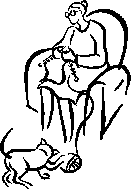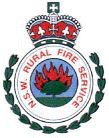Having trouble reading this newsletter? Visit http://www.scotlandisland.org.au/archive.html
Newsletter for Offshore Residents of Pittwater, Australia Volume 7, Issue 73; February 2005
Islanders and offshore communities rose to help support numerous Tsunami appeals this month. It is particularly relevant to all of us as we live so close to the ocean and we realise now the devastation that could be caused by such a terrible event. It has been wonderful to see so many Australians contributing to help those who have suffered so much.
In this Issue:
The privations endured in the early days
of the settlement in 1788' produced its share of grumbles, usually
with great justification.
An extract from a letter to Sir Evan Nepean (a name soon to be
enshrined in local nomenclature) by Major Ross was full of
complaints about the unwelcoming country. "Not one bit of timber
have we found fit for any other purpose than to make the pot boil,"
he lamented. "I think it will be cheaper to feed the convicts on
turtle and venison at the London Tavern than be at the expense of
sending them here"..
Phillip himself wrote that he felt he would have to depend on
regular supplies from England for at least six years for very little
could be grown and convicts who were willing to work the land were
frightened of the blackfellows. They could discover no food on
which, in their opinion, so large a number of aboriginals could
live. They therefore concluded that the black men were cannibals,"
quite ready when their appetites were sharp to kill each other as
well as any white man if they could catch him."
Before December 1790, Phillip began to send out large parties to
shoot kangaroos near Botany Bay and, so long as there was a hill in
sight which he had not explored or an unvisited place likely to
provide food or soil for cultivation, he never rested from his
search for the wherewithal to feed his grumbling people.
Water was also a difficulty (Nothing has changed! L.W.) Here
again Pittwater seems to have appeared desirable In 1790 Phillip
writes "In Pittwater we found small springs of water in most of the
coves. We saw three cascades falling from a height which the
rain then rendered inaccessible." In this case Phillip does not seem
to have traced effect to cause. There is still water to be found in
the coves of Pittwater and some cascades in the rainy season when
they are as easy to![]() find as they were in Phillip's days which,
records show, happened to be a time of abundant rain.
find as they were in Phillip's days which,
records show, happened to be a time of abundant rain.
In 1790 Phillip also went to explore the Hawkesbury as he had always
promised. The party rowed upstream for several miles as well as up a
smaller river which ran in to it. This he called the Nepean. They
found on the banks of these rivers "good, light soil and beautiful
trees like almond trees" and decided the "noble river" was very
suitable for settlement. During the next few months 70 settlers for
sent there. One of the first two was James Ruse, the man who first
grew wheat in Australia.
Next month: The port of Pittwater
- Leicester Warburton
Island Cyclist Hits the
Big Time
Islandia, NY/San Diego, CA – January
5, 2005
Iron Horse Bicycles is proud to announce the signing of 20-year old
professional downhill racer Justin Havukainen. Justin will join the
Iron Horse/Mad Catz Factory Race Team for the 2005![]() season and
contest the UCI World Cup Series, US Open, US National
Championships, select NCS Races, and the Sea Otter Classic.
season and
contest the UCI World Cup Series, US Open, US National
Championships, select NCS Races, and the Sea Otter Classic.

Justin joins the 2005 Iron Horse/Mad Catz roster along with 2004
Australian National Champion, 2004 US Open Champion, and 2-time
Junior World Champion Sam Hill of Perth, Australia. In 2004, Justin
had several top 10 UCI World Cup finishes, finishing 15th overall in
the series. Justin resides in Australia and has the unique advantage
of holding dual citizenship for the United States and Australia,
allowing him to compete at the 2005 US National Championships at
Mammoth, CA.
“We brought Justin to our program to expand Iron Horse’s presence in
the North American market and a chance to win the US National
Championships. We’re excited to have Justin onboard and I look
forward to working with him.” comments Iron Horse/Mad Catz Team
Manager Sean Heimdal.
Massive Reward Proposed for information on Tree Poisoners
At its first meeting for 2005, Pittwater Council will debate a
Notice of Motion to increase the reward from $1,000 to $10,000 for
information leading to a conviction of persons responsible for any
major tree poisoning.
This arises from a serious tree poisoning which took place at
Bilgola Plateau on Christmas Day 2004. Fourteen eucalyptus
botryoides trees, as well as dozens of smaller trees on two
properties, were poisoned, leaving the two neighbouring residents
with a bill of over $15,000 for their removal.
Both families were devastated at the vandalism and were distressed
and unsure as to how they could afford to pay for the removal of the
dead trees.
Can you help?
I am returning to the island - having lived and worked in Wollongong
since 1990.
Part of the reason for coming back is to hopefully find work for my
son, Martin, who has an intellectual disability (Fragile X
syndrome). HE HAS WORKED FOR 12 YEARS IN A SUPPORTED EMPLOYMENT
PLACE BUT WANTS TO WORK in open or regular employment.
What do you think? Martin is 32, good and strong, very social, has a
a good sense of humour and loves boats. he has his boat licence. He
was brought up on the island so some people who are still here
remember him.
He wants an active job that involves working with other people. He
worked for 12 years in a paper recycling plant and particularly
enjoyed going out on the truck with the driver collecting materials
from BHP, offices, etc.
![]()
I look forward to hearing from you on this and hopefully finding
something for Martin in the area. He is registered with Shore
Personnel in Chatswood who would do training, support, etc as
necessary.
Sincerely
Robyn
Associate Professor Robyn Iredale
School of Earth and Environmental Sciences University of Wollongong
02 4221 3448 (o)
02 4268 3487 (h)
0425 216 350 (mob)
02 42214250 (fax)
Small
cuts and scrapes usually don't demand a visit to your local
hospital, but proper care is
necessary to keep infections or other complications from occurring.
When dealing with minor wounds, keep the following guidelines in
mind:![]()
1. Stop the bleeding by applying pressure using a gauze pad or clean
cloth. If the bleeding persists after several minutes of applying
pressure, get immediate medical attention.
2. Keep the wound clean by washing the area with mild soap and water
and removing any dirt. Dry the area gently with a clean cloth, and
cover the wound with a protective bandage. Change the bandage at
least once a day. If the wound becomes tender to the touch and red
or oozes fluid, see your doctor.
3. If your cut is more serious and the bleeding does not stop on its
own or the cut is large, deep, or rough on the edges, try to stop
the bleeding by applying pressure directly to the injury using a
sterilized gauze pad or clean cloth. Maintain pressure on the wound
until the bleeding stops. Then consult your physician. A tetanus
booster may be required if you haven't had one for a while.
Heat Related Emergencies occur
when your heart and vascular system do not respond properly to high
temperatures. The symptoms of heat exhaustion resemble shock and
include faintness, rapid heartbeat, low blood pressure, an ashen
appearance, cold clammy skin, and nausea. If you suspect heat
exhaustion, get the person out of the sun and into a cool spot. La y
the person down and elevate his or her feet slightly. Loosen or
remove most or all of the person's
y
the person down and elevate his or her feet slightly. Loosen or
remove most or all of the person's
clothing. Give the person cold (not iced) water to drink, with a
teaspoon of salt added per quart.
The main indication of heat stroke is a fever of 40+ celsius with
hot, dry skin. Other signs include rapid heartbeat, rapid and
shallow breathing, either elevated or lowered blood pressure, and
confusion or unconsciousness. If you suspect heat stroke, get the
person out of the sun and into a cool spot. Cool the person by
covering him or her with damp sheets or spraying with water. Direct
air onto the person with a fan or a newspaper, and monitor the
person's temperature with a thermometer. Stop cooling the person
when his or her temperature returns to normal. If breathing ceases,
start mouth-to-mouth resuscitation. Heat stroke is an emergency that
needs immediate medical attention.
Give a local plant a home in your garden
with a FREE native plant to Pittwater Residents
 Here
is a wonderful opportunity to plant local native trees and shrubs to
help create wildlife habitat in your backyard! (Limited numbers
apply per residence)
Here
is a wonderful opportunity to plant local native trees and shrubs to
help create wildlife habitat in your backyard! (Limited numbers
apply per residence)
Come along with your questions on composting and worm farming and
also spend a couple of hours in the afternoon learning how you can
use native plants as part of a gourmet meal.
Free Native Plant Giveaway to Pittwater Residents 9am - 3pm
Composting 9am - 2pm
Bushtucker Workshop noon - 2pm
Meet at the Coastal Environment Centre, Lake Park Road, North
Narrabeen. Families welcome and bookings for the free Bushtucker
Workshop can be made by ringing 9970-6905
30-Second Stress Buster
Exercise
Do you feel tension in your forehead or clench your jaw? These two
quick routines have often been claimed to not only reduce tension in
the facial muscles, but also increase circulation, and thus reduce
wrinkles in the long term. They are known as facial gymnastics: -
Inhale: and raise your eyebrows as much as you can.
Exhale: and draw them together in a deep frown.
Repeat a few more times, pushing the eyebrows higher and lower each
time
Inhale: close your eyes and place your fingertips of both hands on
the centre of your forehead.
Exhale: stroke the fingers out to the edges of the temples, wiping
away any last tension.
Repeat a few more, times and then feel the muscles of your forehead
relaxing and spreading out.
Now smile, and take the corners of your mouth as wide as you can:
imagine or say out loud the letter sound “eeeee”.
Then perse your lips and imagine, or say out loud, the sound “oouu”
; as in “you”.![]()
Repeat a few more times, stretching and squeezing the muscles more
each time.
Then relax, and if you haven’t burst out laughing, or caused the
office to laugh yet, feel how much more relaxed, plump and well
nourished the cells / muscles of the face feel. Notice how much of
the pent up tension in the face and jaw has melted away. If you have
been laughing, then enjoy the rejuvenating effect that has had on
you too! [with thanks to Zen at Work]
It was delightful to see the well
deserved award, that of Pittwater Council Citizen of the Year, being
presented to Claire Atkins and Emmie Collins by Mayor, Lynne Czinner
at our local Australia Day breakfast at Newport.
A number of islanders made the early morning journey over to Newport
see the presentation ceremony and to show their support for Emmie
and Claire. These people certainly were rewarded for their journey -
both Claire and Emmie responded with excellent speeches which summed
up our life in the offshore communities, its spirit and its
heritage.
Congratulations go to both on the award which recognised their
inspiration, hard work and leadership in bringing the "28 days on an
island" festival together.
Joy Nielsen.
Showcasing Seniors in Pittwater
Pittwater Council is hosting a
photographic competition - ‘Showcasing Seniors in Pittwater’- as
part of Seniors Week 2005. Council thanks the Department of Ageing,
Disability & Home Care, which has contributed a grant of $500
towards this event.
To enter all you need to do is take a photo of an individual, or a
group of people, showing their participation or achievements within
the Pittwater community. Your subject/s should be over 55 years of
age, and your photo should showcase the contribution older people
make to the Pittwater community.
Entries are welcome from amateur photographers of all ages, with
either colour or monochrome (black and white) photographs accepted.
There are two categories - large (10” x 8”) or small (6” x 4”) - and
there is also a special category for seniors over 55 years of age.
A panel of judges will determine the winners, and all entrants will
be notified of the results. Prizes will be available for the best
small and large entry, the top three overall entries, and the top
entry by a senior aged over 55 years. All entrants will be invited
to attend an exhibition and a prizegiving lunch held during Seniors
Week in March. Your entry will then form part of a roving display
which will tour Pittwater.
Entries close at 5pm on Friday 25th February 2005. To obtain all the
details along with an entry form, either view Pittwater’s website:
www.pittwaterlga.com.au, grab a ‘Showcasing Seniors in Pittwater’
flyer from Pittwater’s community centres, customer service centres
and libraries, or contact Jennifer Walker on 9970 1199. ![]()
Clean up
Australia Day Sunday March 6th 2005
We would now like to have the names and telephone numbers of
everyone who wishes to help on a major clean up on march 6th. Please
email your details to
crhaskell@bigpond.com asap.
Once we have got a list of all the people involved we will be able
to plan and advise more details .

Obviously the more volunteers we have the more we can achieve.
We will be targeting abandoned vehicles, boats, and cleaning up the
foreshores at the wharves and the reserves. We will also be
targeting all items which can not be picked up in the general clean
up such as batteries, paint tins, etc..
There will be more information on the clean up in further bulletins
and on posters around the island and at the wharves. We hope that
everyone will get involved and make this year's clean up a really
successful event.
Thank you.
Join your local Brigade
![]()
Have you ever thought about joining your local Rural Fire Brigade?
On the Island, the Brigade is involved in everything from fighting
fires through to assisting the Ambulance Service with Medivacs and
attending storm damage and fallen trees. Our members have fought
fires
 throughout
the District and the State and the boat is regularly called out to
attend callouts throughout Pittwater and up the Hawkesbury.
throughout
the District and the State and the boat is regularly called out to
attend callouts throughout Pittwater and up the Hawkesbury.
We hold Brigade Training on the first
Sunday of the month to which we invite any interested people to come
along and have a look. The next Brigade Training day is this Sunday,
6 February, starting at 9.00am at the Station on Scotland Island.
Call us on 9999 4404 or call your local Brigade to find out more.
As our newsletter continues to grow
(nearly 800 readers) we are including some links to other
nearby organisations and events that may be of interest.
If you would like to contribute, please send a message to
the editor by
clicking here.![]()
Local Real
Estate Agents: 
| Botham Real Estate | L.J.Hooker Mona Vale |
| PMC Hill (subscribe to their newsletter here) | Pittwater Real Estate |
Government Organisations:
- Local Pittwater Council, or email them at pittwater_council@pittwater.nsw.gov.au or by clicking here.
- State: John Brogden, Member for Pittwater, or email him at jbrogden@nswcoalition.com or by clicking here
- Federal: Bronwyn Bishop, Member for Mackellar, or email her at Bronwyn.Bishop.MP@aph.gov.au or by clicking here
Local Accommodation:
Local Pittwater Studies Website: http://www.pittlink.net/ls/index.html Emergency Contact Numbers
Emergency Scotland Island Water Contacts: click here for information (while online) |
| Sydney Airport: Arrivals and Departures | Qantas Information |
| Sydney Buses information. | Virgin Blue Information |
| NSW Railway Timetables and Information. | Jetstar Information |
Weather
- Tides, Moon phases, Sun rise & set for Sydney
- Weather Forecast from the Bureau of Meteorology in Sydney, Australia
| Join SIRA You can now join the Scotland Island Residents Association by clicking here. Please print the page you see and return the completed form to SIRA at this address: The Treasurer, SIRA, PO Box 70, Church Point 2105. Please NO CASH. Contact SIRA at sirapittwater@hotmail.com | Join WPCA To join the Western Pittwater Community Association, contact Larry at larrye@aftrs.edu.au or click here or phone 02-9979-5026 for more information. |
Archived Newsletters A complete set of past electronic
newsletters since 2000 can be found and read at http://www.scotlandisland.org.au/newsletters/archive.html or by clicking here ![]() or by visiting
the Mona Vale Library.
or by visiting
the Mona Vale Library.
Spread the Word:
The future of this newsletter is in your hands. More than 700 residents and friends read this electronic newsletter monthly. Please tell your friends and neighbours to subscribe. If you are particularly literate in matters computing, you might like to help them follow the very simple path to subscription. It is easy to join. Simply click here to join, leave or change options or go to following address: http://www.scotlandisland.org.au/signup
Finally:
If you would like to contribute to
this newsletter it's easy!. Send an e-mail to the
editor by clicking here.
Type your
short contribution (100 words would be fine) and assuming
it is of general interest to the community, does not
include matter of a political nature and is not offensive
to your neighbours, it will
appear next month.![]()
SUBSCRIPTION INFORMATION:
To get on and off this newsletter, or to change your options, - click here or got to: http://www.scotlandisland.org.au/signup
The views expressed in this newsletter are not necessarily the views of the Scotland Island Residents Association (SIRA), or any of the associated Pittwater Offshore Resident's Committees
![Newsletter Design:Maskar Pty Ltd [0403-442-764]](https://ymlp.com/https.php?id=www.scotlandisland.org.au/newsletters//nletter_header.jpg)
